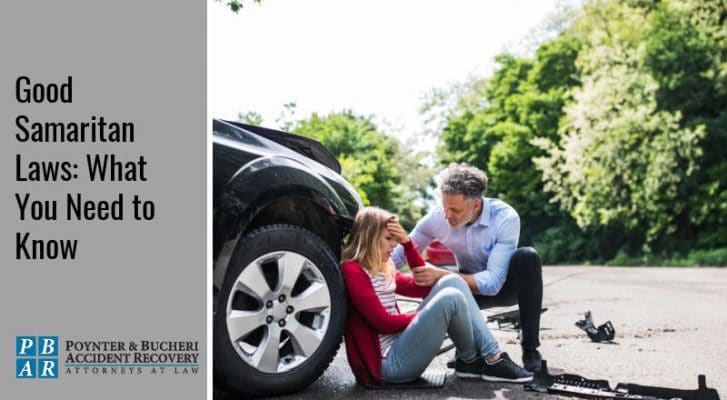
Good Samaritan Laws: What You Need to Know

In this article, you will read:
- The Actual Indiana Good Samaritan codes
- A simplified explanation of what the codes mean for you
- Tips for bystanders
Indiana Good Samaritan Codes
(b) Except as provided in subsection (c), a person who comes upon the scene of an emergency or accident, complies with IC 9-26-1-1.5, or is summoned to the scene of an emergency or accident and, in good faith, gratuitously renders emergency care at the scene of the emergency or accident is immune from civil liability for any personal injury that results from:
- (1) any act or omission by the person in rendering the emergency care; or
- (2) any act or failure to act to provide or arrange for further medical treatment or care for the injured person; except for acts or omissions amounting to gross negligence or willful or wanton misconduct.
(c) This subsection applies to a person to whom IC 16-31-6.5 applies. A person who gratuitously renders emergency care involving the use of an automatic external defibrillator is immune from liability for any act or omission not amounting to gross negligence or willful or wanton misconduct if the person fulfills the requirements set forth in IC 16-31-6.5.
(d) This subsection applies to an individual, business, or organization to which IC 16-31-6.5 applies. An individual, business, or organization that allows a person who is an expected user to use an automatic external defibrillator of the individual, business, or organization to in good faith gratuitously render emergency care is immune from civil liability for any damages resulting from an act or omission not amounting to gross negligence or willful or wanton misconduct by the user or for acquiring or providing the automatic external defibrillator to the user for the purpose of rendering the emergency care if the individual, business, or organization and the user fulfill the requirements set forth in IC 16-31-6.5.
(e) A licensed physician who gives medical direction in the use of a defibrillator or a national or state-approved defibrillator instructor of a person who gratuitously renders emergency care involving the use of an automatic external defibrillator is immune from civil liability for any act or omission of the licensed physician or instructor if the act or omission of the licensed physician or instructor:
- (1) involves the training for or use of an automatic external defibrillator; and
- (2) does not amount to gross negligence or willful or wanton misconduct.
The urge to help other people in times of need is human nature. Unfortunately, we live in a litigious society, and many people are unsure if they have the right to intervene in an emergency. This is why we have Good Samaritan Laws.
These laws, named after a parable from the Bible, were enacted in Indiana to protect off-duty medical personnel who helped those experiencing medical emergencies, such as choking, having a heart attack, or experiencing heart arrhythmia. The laws also cover bystanders or non-medical rescuers.
About 30% of people who have CPR performed on them experience a cracked rib or broken sternum. However, the AHA (American Heart Association) estimates that 100,000 to 200,000 lives are saved each year as a result of CPR. Furthermore, they state that the earlier CPR is initiated, the greater the chances of survival. Clearly, it is better to live with a cracked rib than to die, but Good Samaritan Laws take the element of doubt out of the situation.
Indiana’s Good Samaritan Laws state that someone who comes across the scene of an accident or medical emergency and renders emergency care in good faith cannot be sued for any personal injury that results.
There are a couple of caveats to keep in mind:
- The word “gratuitously” is used in the code. This means that if you render emergency care, you must not do so under the expectation of any kind of reward (or even award).
- You cannot significantly or willfully cause more harm than good. That would be considered grossly negligent (and not acting in good faith).
- The other part of the Good Samaritan Law is that bystanders are not obligated to help. This isn’t the case in all states. For example, in Vermont, Rhode Island, Minnesota, California, Hawaii, Massachusetts, Ohio, Washington, and Wisconsin bystanders are required to act to help in some sort of capacity.
In Indiana:
- You cannot be sued or criminally charged for acting to help in a manner that is reasonable under the circumstances
- You cannot be sued or criminally charged for failure to help
Some Tips:
- Take CPR class: The American Heart Association and The American Red Cross both offer CPR training (the Red Cross even offers online certification), but there are many other options.
- If possible, learn how to operate an AED (Automatic External Defibrillator). The NIH (National Institutes of Health) reports that 1,700 lives are saved each year by bystanders using public AEDs.
Learn the Heimlich Maneuver. Approximately 4,000 people die each year from choking. - If you are first at the scene of a medical emergency, call 911.
- Do not attempt to do something you have no idea how to do.
- If there is no additional danger (fire or explosion), do not move anyone who may have a back or neck injury.
- If the injured person refuses help, do not try to help.
- If the injured person is unconscious, you may help under the assumption of implied consent.
- If you do help, do not accept any reward.
If someone is threatening to sue you because you rendered aid in good faith at the scene of a medical emergency, speak to an experienced attorney today. You can trust our attorneys at Poynter & Bucheri to give you an honest assessment of your case and to help you understand your legal options. Call for a free case review: 1-800-265-9881. Or contact us online.
